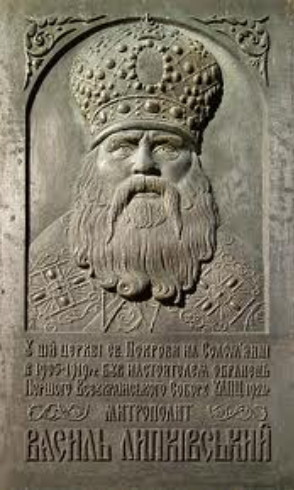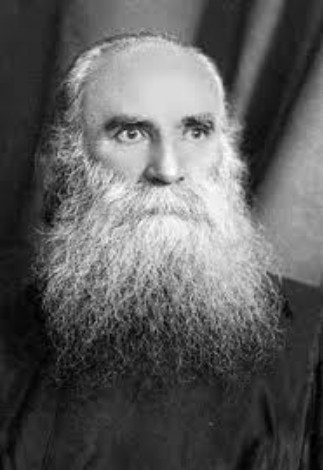Lypkivsky, Vasyl
Lypkivsky, Vasyl [Липківський, Василь; Lypkivs’kyj, Vasyl’], b 19 March 1864 in Popudna, Lypovets county, Kyiv gubernia, d 27 November 1937. Church leader; cofounder and metropolitan of the Ukrainian Autocephalous Orthodox church (UAOC). He studied at the Uman Theological School (1873–9), the Kyiv Theological Seminary (1879–84), and the Kyiv Theological Academy (1884–9). He was ordained in 1891, and from 1892 to 1903 he was dean of the cathedral in Lypovets and supervisor of the schools in Lypovets county. In 1903–5 he lectured on canon law in the Kyiv Church Teachers' School, but he lost this position for his support of a separate Ukrainian church. With the fall of the tsarist regime as a result of the Revolution of 1917, Lypkivsky joined the struggle for the establishment of an independent Ukrainian Orthodox church. He was elected chairman of the Kyiv Eparchial Sobor and of the Brotherhood of the Resurrection, which later became the All-Ukrainian Orthodox Church Council. He was a member of the All-Ukrainian Higher Holy Council. In May 1919 he celebrated the first Liturgy in the Ukrainian language—after translating many of the liturgical books into modern Ukrainian—in Saint Nicholas's Military Cathedral in Kyiv. Although this action was opposed by the Russian hierarchy, who defrocked Lypkivsky, it was welcomed by supporters of the emerging Ukrainian national church. In the summer of 1919 Lypkivsky became parish priest of the Saint Sophia Cathedral in Kyiv.
In October 1921 the All-Ukrainian Orthodox Church Council in Kyiv, which had declared the establishment of the Ukrainian Autocephalous Orthodox church in May 1920, elected Lypkivsky the first metropolitan of the church. When bishops of the official Russian Orthodox church denounced the election and refused to consecrate the new metropolitan, the sobor revived the ancient Alexandrine tradition of ‘the laying of hands’ to consecrate Lypkivsky without the participation of other bishops. Without a traditional episcopal ordination, Lypkivsky was constantly vilified by the Russian church as a noncanonical bishop outside the apostolic succession. His legitimacy was also questioned by other churches and some of the Ukrainian faithful. Nonetheless, Lypkivsky devoted himself to organizing the new church. He traveled throughout Ukraine, visiting more than 500 parishes after his election and overseeing the growth of the UAOC (by 1927 the church claimed 36 bishops and over 2,500 priests). Insisting on the active participation of the laity in church affairs, he propagated many church reforms, and he modified many Orthodox canons and traditions, including the absolute celibacy of bishops, with the result that married men were admitted to episcopal ordination. He was also insistent on preserving the independence of the Ukrainian church vis-à-vis the Moscow Patriarchate. Lypkivsky's popularity soon earned him the enmity of the Soviet authorities, who, after arresting him a few times, had him dismissed by the All-Ukrainian Orthodox Church Council in 1927. From 1927 to 1937 he lived in a Kyiv suburb, under virtual house arrest and in poverty. He was arrested by the NKVD in November 1937, charged with anti-Soviet activity, and summarily executed (although it was commonly believed that he had survived at least to early 1938).
Lypkivsky wrote prolifically on canon law, church history, and theology, but most of his writings remained in manuscript and were destroyed during the Second World War. Only the last volume of his seven-volume history of Ukrainian Orthodoxy was published (posthumously). This volume, concerning the history of the Ukrainian Autocephalous Orthodox church, has appeared in three different editions, the most authoritative of them edited and annotated by Semen Sawchuk as Vidrodzhennia Ukraïns'koï Tserkvy (1961). Several of Lypkivsky's articles appeared in postwar periodicals, including ‘Ukraïns’ka Avtokefal’na Tserkva i radians’ka komunistychna vlada’ (The Ukrainian Autocephalous Church and Soviet Communist Rule) in Vil’na Ukraïna (United States) (1955–8) and ‘Iak Ukraïns’ka Tserkva povernula sobi voliu’ (How the Ukrainian Church Regained Its Freedom) in Ukraïns’ke pravoslavne slovo (1956). A collection of his sermons, including a short autobiography, Propovidi na nedili i sviata (Sermons for Sundays and Holidays, 1969), and a number of his letters to Rev P. Maievsky in 1933–7 also appeared posthumously in the West, and an autobiography appeared in Poland in the journal Nasha kul’tura (Warsaw) in 1936. The fullest to date, six-volume, edition of Lypkivsky’s writings was published in 2019 in Kyiv under the title Vybrani tvory mytropolyta UAPC Vasylia Lypkivs'koho (1864–1937) (Selected Works of UAOC Metropolitan Vasyl Lypkivsky [1864–1937]).
BIBLIOGRAPHY
Bilanych, J. De evolutione Ecclesiae Orthodoxae Ukrainorum annis 1917–1942, diss (Rome 1943)
Heyer, F. Die Orthodoxe Kirche in der Ukraine von 1917–1945 (Köln-Braunsfeld 1953)
Lypkivs’kyi, V. Vidrodzhennia Tserkvy v Ukraïni 1917–1930 (Toronto 1959)
———. Vidrodzhennia Ukraïns’koï Pravoslavnoï Tserkvy (Winnipeg 1961)
Sadylenko, M. Sumni naslidky lypkivshchyny v Ukraïns’kii Pravoslavnii Tserkvi (Toronto 1978)
Armstark, R. Die Ukrainische Autokephale Orthodoxe Kirche: Erinnerungen des Metropoliten Vasyl’ K. Lypkivs’kyj (Würzburg 1982)
[This article was updated in 2019.]

.jpg)

